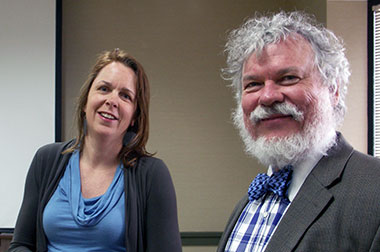Wisconsin Education Policy Expert Talks Race to the Top
MAY 2013
 There's a movement underfoot in the United States to reform the country's public education system, and it's redefining the political landscape from Washington to Wisconsin, according to Sarah Archibald.
There's a movement underfoot in the United States to reform the country's public education system, and it's redefining the political landscape from Washington to Wisconsin, according to Sarah Archibald.
Archibald, an education advisor to state Sen. Luther Olson and an architect of Wisconsin's first Race to the Top proposal, was invited to address the graduate-level Education Policy and Reform class at the LaFollette School of Public Affairs. The class is taught by Rob Meyer, the Director of the Value-Added Research Center (VARC), a project housed in the Wisconsin Center for Education Research. Archibald, who earned a master's degree from the La Follette School of Public Affairs in 1998 and received her doctorate in educational leadership and policy analysis from UW-Madison's School of Education, worked with Meyer at VARC prior to her public service.
Race to the Top awarded hundreds of millions of federal dollars to states that enacted reforms to address education standards, improve the recruitment, development, and rewarding of effective teachers and principals, create data systems, and turn around low-performing schools. It was a great idea with goals that failed to gain traction in Wisconsin, Archibald told Meyer's students.
"What (the Obama administration) did with the grant that I think was brilliant was say, 'If we give this money to the state departments of education in the way we have done with all prior grant funding, we're not going to get the results we want, but we happen to know we have some reform-minded governors who had been moving their states in the right direction, and that if the governor's office could push the Department of Public Instruction, or the similar entities in other states, that it might actually achieve some more movement.'"
Wisconsin was not a state that had been moving in a reform direction when Archibald agreed to lead Wisconsin's first round Race to the Top application. On the contrary, the receptivity to reformers was so lacking at the time that Archibald's research colleagues warned her that taking on this task in this environment was like "scuba diving in a meat suit."
Wisconsin failed in its first bid for Race to the Top funds because the state, and particularly DPI, were slow to innovate in ways that were expected by the U.S. Department of Education, which oversaw the grant funding, Archibald said. The main sticking point was strong support statewide for local school boards. This support made enacting changes that would shift decision-making powers from the local to the state level difficult, Archibald added.
"There is a serious desire for local control in this state, and (local boards) do not want to be told what to do or how to do it," Archibald said.
Archibald, who worked for a Democratic governor and now serves on the staff of a Republican state senator, said the politics of education reform are complex, and are further complicated in that they do not divide along traditional party lines.
She pointed out the dichotomy that exists within the Republican Party today, as the Republican National Committee recently announced its opposition to the Common Core State Standards Initiative even as governors such as Wisconsin Gov. Scott Walker openly profess their support for education reform.
"I will say that the current governor is very engaged on the policy level on education," Archibald said. "He comes to meetings of working groups and he stays the whole time. He's engaged in what people say and he tries to make the conversation productive. He seems sincere in his desire to have a major reform effort come out of his administration."
Archibald said she's not surprised to see the political landscape shift, just as it has since her own time working for a Wisconsin governor. Efforts at improving the state's educational system shouldn't be driven by politics, she said, but rather by evidence-based policymaking.
"Whatever your politics, everyone involved in education in Wisconsin needs to ask themselves what their vision is for making sure every child graduates from a Wisconsin school, public or private, with a meaningful degree signifying a high quality education," Archibald said. "That needs to be the state's priority, and we're not getting that job done for enough of our kids doing things the way we've always done them. Change may be uncomfortable, but it's the only way we're going to get better outcomes."
